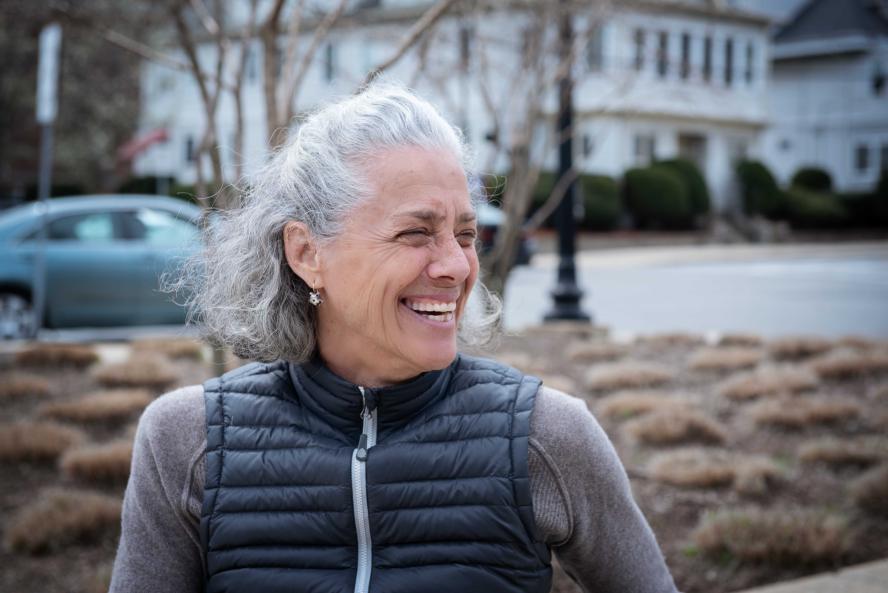A Full Life

By: Maisie O'Brien
Lecturer Sarah Skeels made a deal with herself at twenty-three years old: If she were to survive the near-fatal bicycle crash that left her with paraplegia, then she would never again allow herself to say “I wish I would have.” She committed herself to living a full, adventurous life with few regrets.
At the time of her injury, Skeels was working as a physical therapy aide caring for patients living with HIV/AIDS and preparing to start a graduate program in physical therapy. Her own path to recovery was long and arduous. She suffered a severe concussion and lost the use of her legs and right arm. She spent two years learning how to live independently and reconsidering her life goals.
“My main objective was always to live as freely as I possibly could,” Skeels says. “I wanted to work in healthcare, but I wasn’t sure I would be able to go back to school after my accident. This was before the Americans with Disabilities Act and every physical therapy program I spoke to said I couldn’t possibly be a physical therapist and a wheelchair user. But you couldn’t kick a wheelchair user out of public health school, so that’s where I went!”
Her graduate research focused on health promotion and disability. “My focus wasn’t on trying to prevent disability,” she says. “It’s an inevitable aspect of being human. I wanted to understand how to promote health for those who are already living with a disability because it’s a forgotten population in general. Only recently has the disabled community been considered a group that can get and stay healthy.”
After graduation, Skeels worked at a disability rights lobbying organization in DC as well as several small nonprofits serving the disabled community. She was invited to speak at a number of universities, including Brown and Tufts, which led to teaching appointments at both schools.
Skeels is beloved by her students who value the interactive format of her classes, the service projects she assigns, and the guest lecturers she brings in to speak. Teaching in the Tufts OT Department is a full-circle accomplishment for Skeels. “I’m not an OT, but as someone with a spinal cord injury, I’ve had significant treatment by OTs,” she says. “My very first OT was a Tufts graduate and she was the first person to show me that my life could still be valuable after paralysis. It certainly wasn’t my plan to be at Tufts, but it’s interesting how life has unfolded.”
Skeels values the relationship building aspect of being a lecturer. “I love getting to know the brilliant students Tufts attracts,” she says. “They might learn something from me, but I learn just as much from them. In the last five years, I’ve really seen a shift where students are very interested in social justice and health policy, and OT is a great place to advance change in these areas.”
In all of her classes, Skeels emphasizes the importance of client-centered care, which focuses on the needs and preferences of the client during treatment. “OT is wonderful for its holistic, client-centered care,” she says. “At Tufts, we train OTs to consider a client’s unique life history and what interventions are realistic for them. We instruct our students on how to work collaboratively with a client and use language that makes them feel seen, heard, and respected. The point is: The client matters. The client matters. The client matters.”
Outside of teaching, Skeels is involved with several research projects at different universities and area hospitals. She serves as a commissioner and chair of employment for the Rhode Island Governor's Commission for People with Disabilities, and is leading an effort to get people with spinal cord injuries trained as community health workers. She also volunteers with New England Disabled Sports, teaching people with disabilities how to ski.
When Skeels isn’t busy working or volunteering, she enjoys spending time with her family and is a proud mom of a division 1 college lacrosse player. She also loves the outdoors and enjoys gardening, kayaking, and riding her downhill mountain bike. “I love the speed of my bike,” she says. “Some people might find it scary, but I find it thrilling! This is the only body I’m ever going to get, so not only do I need to take care of it, but I might as well have fun with it!”